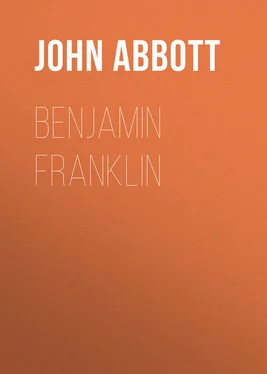John Abbott - Benjamin Franklin
Здесь есть возможность читать онлайн «John Abbott - Benjamin Franklin» — ознакомительный отрывок электронной книги совершенно бесплатно, а после прочтения отрывка купить полную версию. В некоторых случаях можно слушать аудио, скачать через торрент в формате fb2 и присутствует краткое содержание. Жанр: foreign_antique, foreign_prose, на английском языке. Описание произведения, (предисловие) а так же отзывы посетителей доступны на портале библиотеки ЛибКат.
- Название:Benjamin Franklin
- Автор:
- Жанр:
- Год:неизвестен
- ISBN:нет данных
- Рейтинг книги:3 / 5. Голосов: 1
-
Избранное:Добавить в избранное
- Отзывы:
-
Ваша оценка:
- 60
- 1
- 2
- 3
- 4
- 5
Benjamin Franklin: краткое содержание, описание и аннотация
Предлагаем к чтению аннотацию, описание, краткое содержание или предисловие (зависит от того, что написал сам автор книги «Benjamin Franklin»). Если вы не нашли необходимую информацию о книге — напишите в комментариях, мы постараемся отыскать её.
Benjamin Franklin — читать онлайн ознакомительный отрывок
Ниже представлен текст книги, разбитый по страницам. Система сохранения места последней прочитанной страницы, позволяет с удобством читать онлайн бесплатно книгу «Benjamin Franklin», без необходимости каждый раз заново искать на чём Вы остановились. Поставьте закладку, и сможете в любой момент перейти на страницу, на которой закончили чтение.
Интервал:
Закладка:
Early in the afternoon he came to a hamlet, by the roadside, where he found himself so exhausted by the unaccustomed toil of walking, and by exposure to the rain and the miry roads, that he felt it necessary to remain until the next morning. The aspect he presented was shabby and dilapidated in the extreme; for he was in his working dress, which by the wear and tear of travel had become greatly soiled and tattered. He was not a little mortified to find that the inhabitants of the cabin, while they treated him kindly, evidently regarded him with suspicion as a runaway apprentice.
In the gloom of that night, poor Benjamin bitterly repented the step he had taken, and earnestly wished himself back again in the home which he had forsaken. Clouds and darkness had gathered around his path and he could see but little bright beyond. Early the next morning he resumed his travels, pressing vigorously along all day. When the shades of night enveloped him he had reached a point within ten miles of Burlington. He passed the night comfortably in a settler’s cabin, and early the next morning pressed on to the little village of Burlington, from which he was informed that a boat started every Saturday, to descend the still silent and almost unfrequented shores of the Delaware to Philadelphia. Much to his disappointment he reached Burlington just after the regular Saturday boat had gone, and was informed that there was no other boat to leave until the next Tuesday. He made his united breakfast and dinner upon gingerbread, which he bought in the street of an old woman.
Burlington was on the east side of the river, Philadelphia was on the west. There was no road between the two places, the communication being by the river only. It seemed impossible for Benjamin to toil that distance through the pathless, tangled forest. He had but five shillings in his pocket. With the utmost economy that would not defray his expenses at Burlington, for three days, and leave a sufficient sum to pay his passage down the river.
In his distress and perplexity, our young philosopher, whose renown for wisdom subsequently filled all Christian lands, turned back to the poor, aged woman of whom he had bought his gingerbread and solicited her advice. The good old soul, not insensible to the charms of the frank and manly looking boy, with motherly tenderness insisted on his going to her own humble home. Gladly he accepted the invitation. The dinner consisted of what is called ox-cheek; Franklin contributed a pot of beer.
Walking out early in the evening upon the banks of the river, he found, to his great joy, a chance boat had come along, bound to Philadelphia and containing many passengers. Eagerly Franklin joined them, and bidding adieu to his kind entertainer, was soon drifting slowly down the stream. The night was dark, there was no wind, and no cheerful gleam from the white man’s cabin or the Indian’s wigwam met the eye. It was necessary to resort to rowing. At length, a little after midnight, several of the passengers insisted that they must have passed Philadelphia without seeing it, and refused to row any farther. They therefore ran the boat into a little creek, built a rousing fire, for the night was damp and chill, and ranging themselves around its genial warmth awaited the dawn of the morning. The light revealed to them Philadelphia but a few miles below them. It was Sunday morning. At nine o’clock the boat was made fast at Market street wharf, and Franklin, with one silver dollar and one shilling in copper coin in his pocket, stepped on shore. All his copper coin he paid for his passage.
Such was the introduction of the future Governor of Pennsylvania to the realm over which he was eventually to preside as Governor, and of which he became its most illustrious citizen.
He was unquestionably dressed in the peculiar and picturesque costume of the times. He wore knee breeches of buckskin, and a voluminous overcoat, lined with pockets of astonishing capacity, which pockets were crammed with shirts and stockings. A low, battered, broad-brimmed hat covered his clustering ringlets. His coarse woolen stockings displayed to advantage the admirably moulded calves of his legs. Every article of this costume was draggled, shabby, soiled, and much of it tattered.
With an indescribable feeling of loneliness, exhausted with the toilsome and sleepless night, and with the cravings of hunger, he sauntered up into the town. Coming across a baker’s shop, he stepped in, and called for three pennyworth of bread. In Philadelphia, food was abundant and bread was cheap. To his surprise three long rolls were given to him. He took one under each arm, and in his hunger the homeless boy walked along devouring the other. Philadelphia was then a village widely spread out, with surrounding vegetable gardens, and containing a population of about seven thousand inhabitants.
Benjamin walked listlessly along as far as Fourth street. He chanced to pass the house of a Mr. Read, whose very pretty daughter, Deborah, was standing at the front door. She was eighteen years of age, and was much amused at the comical appearance which the young man presented as he passed by.
It is not easy to imagine in these days, the state of society in these early settlements, hewn out from the forests on the river’s banks, and with the unexplored wilderness spreading out to unimagined regions in the interior. At night, even from the houses of the village, the howling of the wolves could be heard as they rushed after their prey. Bears and deers were shot in abundance. And Indian bands, painted and plumed, were ever swarming through the streets.
Franklin walked along, devouring his rolls, and returned to the river for a drink of water. Such was his first breakfast in Philadelphia. In the boat was a poor woman with her child. Franklin gave to her the two remaining rolls, which he could not conveniently carry about with him.
Not knowing what to do, and led by curiosity to explore the town, he returned to Market street, then one of the chief avenues of the city. It was a little after ten o’clock in the morning. The street was crowded with well-dressed people, pressing along to church. There was one important edifice called the “Great Meeting House” of the Quakers. It stood at the corner of Second and Market streets.
Franklin joined the crowd, and took his seat with the vast assembly. He soon fell soundly asleep. The hour passed away. The congregation dispersed, and Benjamin was left still asleep. Some one then kindly awoke the tired traveler, and he again stepped out into the streets so lonely, where there was not an individual whom he knew, and where almost without money he could find no refuge which he could call a home.
As he walked toward the river, he met a young Quaker whose countenance pleased him. Of him he inquired where he could find a respectable and comfortable lodging. The friendly Quaker led him to a tavern, near Chestnut street, called the “Crooked Billet.” Franklin ordered a frugal dinner, threw himself upon the bed, and slept till supper time, and immediately after supper went to bed and slept soundly till the morning.
He had now been from home eleven days. His money was nearly expended. His clothes were worn; and almost the only hope remaining was the very visionary one that Mr. Bradford’s son might possibly have some employment for him. Early in the morning he carefully brushed his travel-worn clothes, his shoes, his hat, and making himself as respectable in appearance as possible, went to the house of the printer, Andrew Bradford. To his surprise and gratification he found the father there, who had just arrived, having traveled from New York to Philadelphia on horseback.
Benjamin met with a courteous reception, was invited to breakfast. He was, however, greatly disappointed in being informed that Andrew Bradford had just engaged another apprentice to take the place of the one who was lost. Mr. Bradford, however, stated that there was a man, by the name of Keimer, who had recently commenced the printing business in the town, and might have employment for him. The old gentleman kindly offered to go to the office with Benjamin, and introduce him to Keimer.
Читать дальшеИнтервал:
Закладка:
Похожие книги на «Benjamin Franklin»
Представляем Вашему вниманию похожие книги на «Benjamin Franklin» списком для выбора. Мы отобрали схожую по названию и смыслу литературу в надежде предоставить читателям больше вариантов отыскать новые, интересные, ещё непрочитанные произведения.
Обсуждение, отзывы о книге «Benjamin Franklin» и просто собственные мнения читателей. Оставьте ваши комментарии, напишите, что Вы думаете о произведении, его смысле или главных героях. Укажите что конкретно понравилось, а что нет, и почему Вы так считаете.









![Benjamin Franklin - Memoirs of Benjamin Franklin; Written by Himself. [Vol. 2 of 2]](/books/747975/benjamin-franklin-memoirs-of-benjamin-franklin-wr-thumb.webp)
![Benjamin Franklin - Memoirs of Benjamin Franklin; Written by Himself. [Vol. 1 of 2]](/books/748053/benjamin-franklin-memoirs-of-benjamin-franklin-wr-thumb.webp)

